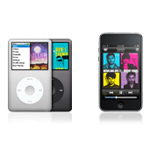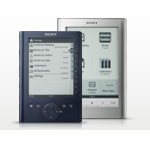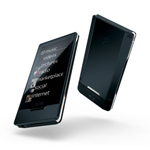I watched with interest as Barnes & Noble released the Nook, an electronic book reading thing that’s pretty similar to Amazon’s Kindle. I immediately thought of Microsoft’s Zune music player, released well after Apple’s iPod had pretty much conquered the world. There are some interesting similarities and also some differences.
Dominant Design
 There are several models of iPod, ranging from the no-screen Shuffle to the all-screen Touch. As with mobile phones, each of these styles is pretty well-established and I think it’s safe to say that the last time either category got real innovation was when Apple delivered the iPhone and then the iPod Touch.
There are several models of iPod, ranging from the no-screen Shuffle to the all-screen Touch. As with mobile phones, each of these styles is pretty well-established and I think it’s safe to say that the last time either category got real innovation was when Apple delivered the iPhone and then the iPod Touch.
 The dominant design of an ebook reader seems to have crystalized with the Kindle and to a lesser extent, Sony’s reader products. Black and white e-ink screen, super-long battery life, small or absent keyboard, book-like leather covers optional, and so forth. In this respect, the Nook, like the Zune, adds maybe some incremental improvement, but little of substance or lasting advantage.
The dominant design of an ebook reader seems to have crystalized with the Kindle and to a lesser extent, Sony’s reader products. Black and white e-ink screen, super-long battery life, small or absent keyboard, book-like leather covers optional, and so forth. In this respect, the Nook, like the Zune, adds maybe some incremental improvement, but little of substance or lasting advantage.
Complementary Assets
 Most people agree that the first iPods were not that great as devices, but that it was the iTunes store and the integration of the two that won the day for Apple. This comparison is more interesting for the book readers. By the time Microsoft released the Zune, the iTunes store was huge and dominant, and Apple computers were gaining share against Windows boxes on the back of iPod and iPhone sales.
Most people agree that the first iPods were not that great as devices, but that it was the iTunes store and the integration of the two that won the day for Apple. This comparison is more interesting for the book readers. By the time Microsoft released the Zune, the iTunes store was huge and dominant, and Apple computers were gaining share against Windows boxes on the back of iPod and iPhone sales.
 In the book world, Amazon and Barnes and Noble have pretty much the same assets. I don’t think I’ve ever seen a new book exclusive to either store, at least not with paper books. Ebooks might turn out different, but at least for starters, it seems the two companies have the opportunity to offer the same media selection to their ebook reader customers. Amazon’s store carries far more than books and music, and that might turn out to be important as they put more Amazon-dedication shopping machines into consumers’ hands.
In the book world, Amazon and Barnes and Noble have pretty much the same assets. I don’t think I’ve ever seen a new book exclusive to either store, at least not with paper books. Ebooks might turn out different, but at least for starters, it seems the two companies have the opportunity to offer the same media selection to their ebook reader customers. Amazon’s store carries far more than books and music, and that might turn out to be important as they put more Amazon-dedication shopping machines into consumers’ hands.
Network Effect
 If you can build a network effect into a product, you have a good chance at getting your users to do some serious marketing for you. Social networks thrive on invitations, and they’re more useful as more of your friends join them. Reading and listening to music are somewhat solitary pursuits (I would argue that the iPod and before that the walkman made music solitary when it had been quite social and that greedy music execs have prevented any device I know of having a second headphone jack) so it’s an interesting question how or if ebook readers can go viral.
If you can build a network effect into a product, you have a good chance at getting your users to do some serious marketing for you. Social networks thrive on invitations, and they’re more useful as more of your friends join them. Reading and listening to music are somewhat solitary pursuits (I would argue that the iPod and before that the walkman made music solitary when it had been quite social and that greedy music execs have prevented any device I know of having a second headphone jack) so it’s an interesting question how or if ebook readers can go viral.
Both Microsoft and Barnes and Noble tried making their challenger devices more social. Microsoft’s “squirting” allowed you to send songs via wifi from your Zune to a friend’s Zune for three plays. The songs you squirt are still available to you to listen to while they’re squirted and it seems you can squirt as many songs to as many friends as you like. That seemed to have been too little too late. Apple was allowing DRM-free downloads of some music, and three plays (with a three day time limit) seemed stingy. Plus, with the wifi sending method (as cool as that might be) you have to be physically near your friend to squirt. And let’s not get into the wisdom of calling this “squirting.”
I speculate that Barnes and Noble did some focus research on heavy readers (like book clubbers, for example) and came up with a sharing feature that’s more like what we do with paper books. As I’ve blogged before, I think lending and sharing paper books is a viral part of both reading and friendship. With a Nook, you (the Nooker?) can loan an ebook to a fellow Nook owner (The Nookee?) for two weeks, during which time it is unavailable to you to read. Seems pretty fair and similar to the reality of paper. But then I read that Nook loans can be disabled on a book-by-book basis by the publisher, and even when enabled, allow only one loan of a given title – ever. Not only does that fail to take full advantage of the capability of digital books, it adds a restriction that doesn’t even exist in the paper world. Disappointing First Sale Doctrine Fail.
It seems unlikely that the Nook could win the day on the basis of the sharing feature, even if it did everything I want it to, but the hobbling of that feature looks like just another indicator that the Nook will go the way of the Zune – not gone, but forgotten.

Trackbacks/Pingbacks